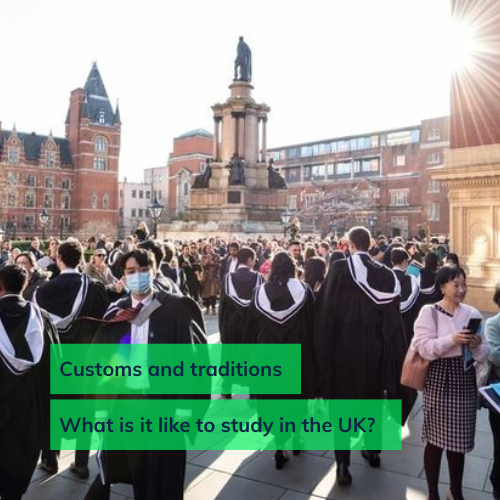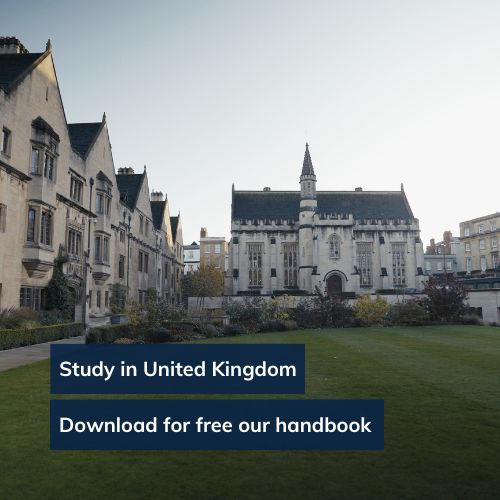From the 1st of February 2020 Britain has left the European Union, a process that is now widely known as Brexit. Brexit has impacted not only the political scene, but also many other aspects of people’s lives, such as education. For students outside the EU, things have not changed much. However, EU students now need to apply for a visa, and university fees have changed, putting everyone that is not from the UK on the same level.
Summary
- University fees and other expenses
- Scholarships, loans & study-working in UK
- Documentation
- How do UK Universities work post Brexit?
1. University fees and other expenses
1.1 Studying in the UK after Brexit: what has changed for EU students?
Before Brexit, EU students paid the same fees as British students. Today, EU students are considered the same as all other international students and pay the same fees.
This had a strong effect on the enrollment rates with a multinational community that has shifted more towards Asian origins (e.g. India & China).
UK students currently pay around £9,250 per year for undergraduate courses, while international students have a different scheme depending on the course they apply for. Minimum fees for some courses are around £18K per year (e.g. University of Essex) up to over £60K per year for courses at Cambridge or Oxford.
Postgraduate degrees have a wide spectrum of fees that depend not only on the institution you apply for but also on the type of course. Applied and practical courses are usually more expensive than theoretical degrees, as they require access to laboratories, tools, and equipment needed to complete the course.
However, if you are an EU student and you are willing to study in the UK don’t worry, as there are different routes you can take to fully or partially cover university fees and other expenses associated with your education.
1.2 Attending a PHD in the UK after Brexit
If you are willing to continue your studies and obtain a PhD in the UK there are different pathways that you can follow:
– most PhDs that you see advertised have scholarships that cover university fees and support you with a regular salary. This is enough to live comfortably in the UK, pay your rent and living costs. Remember though that you are still a PhD student, so spend your money wisely.
– there are, however, PhDs that get advertised, but don’t have a scholarship available yet. In this case, if you can cover fees and expenses you can still contact the supervisor and apply for the PhD. Alternatively, you can apply for fundings both in the UK or even outside the UK to support your PhD.
There are various funding bodies both in the public and private sectors which can support you along this journey. If you go down this route you also have the possibility in some cases to come up with your own ideas. For instance, some funding bodies might support your PhD within the area of interest of their investments and might ask you to find a specific topic to study and analyse.
2. Scholarships, loans & study-working in the UK
2.1 Scholarships
There is a wide variety of scholarships available for international students to study in the UK. These scholarships can fully or partially cover university fees, living expenses, and return flights to the UK. Scholarships are available both for undergraduate and postgraduate courses.
The majority of the scholarships available in the UK can be found on the British Council’s official website.
Some of these scholarships are extremely competitive especially if you are looking into top ranked universities such as Oxford & Cambridge.
If you are not successful in obtaining one of these scholarships don’t worry, there are still some options to avoid paying fees immediately or to cover these expenses in some other way.
2.2 Student loans to study in the UK
The UK offers student loans for families who cannot afford to pay university fees. This will cover your university fees entirely and will help you with your living expenses. Once you have finished studying you will start paying back your loan, but only if you earn above a certain salary. The size of your monthly repayments will depend on how much you earn, not what you owe.
Here you can find more information about student loans the UK offers.
2.3 Study-working in the UK
Finally, if none of the above-mentioned options suits your needs, you can always think about looking for a part-time job to support your finances while you are studying.
In this case there are a few things you need to take into consideration:
– studying in the UK can be challenging, especially if English is not your mother tongue, so at least at the beginning you might find that this is something that can take away some time from your studies.
– university courses, especially those in top ranked institutions, can be extremely demanding not only in terms of brain power and effort, but also in terms of time. Some courses also require practical assignments, short trips, and in some cases longer stays, especially during the dissertation project. Keep this in mind, if you start working while studying you might be required to leave your campus and city for some time.
3. Documentation
Before you leave your country or book any flight to the UK you must be aware of all of the relevant documentation required to stay in the UK as a student.
3.1 UK student VISA
If required from your country/nationality you will have to apply for a student visa to cover the whole duration of your stay in the UK.
It will cost you £348 to apply for a student visa if you are outside the UK. That rises to £475 if you are already in the UK. In order to apply, you’ll need to show that you have been offered a place at a UK university. You can show this with a Confirmation of Acceptance for Studies (CAS) document from your institution.
3.2 IELTS certification
You’ll also need to show on your visa application that you speak English at the level you’ll need in order to live and study in the UK.
To do so, you’ll need a score of at least 59 on PTE Academic for most universities.
The most commonly required English test for UK universities is IELTS. Depending on the institution and level of degree that you are applying for, you will be asked for different IELTS scores. However most universities accept between 6.0 and 6.5 as an overall score (reading, writing, listening, speaking), but for top ranked institutions such as Oxford and Cambridge the target is much higher, usually between 7.0 and 7.5 as an overall score. Depending on the course, there are also minimum marks that you need to reach for each section of the IELTS exam (reading, writing, listening, speaking).
If you are willing to prepare for the IELTS exam to study in the UK don’t worry, we offer online full preparation on all sections of the test with a certified native teacher who will help you along this process. If you join one of our tours in the UK you will also receive a special discount on the IELTS preparation package.
3.3 Immigration health insurance
You will also need to pay the immigration health insurance which is £470 per year, for every year of your degree. This charge allows you to use the National Health Service (NHS) during your time in the country.
If you decide not to pay the health insurance or if this expires you need to know what happens. If you are an EU student you are covered for basic health assistance, if you are an international student you are only covered in case of accidents or emergencies.
3.4 Other documentation
You’ll need to show that you have sufficient funds to pay your course fees for at least the first year of your studies. Many international students also need to show that they have enough money to cover their living expenses while studying, but EU students are exempt from this requirement.
More info available here: https://www.gov.uk/student-visa/money.
When you apply for a student visa or a standard visitor visa, if you join our tour in the UK, we can write a supporting letter to show to your local embassy. This will help you in the application process and improve the chances of success. Remember though that we can’t apply for any visa on your behalf as this is strictly against the law.
Finally, if your stay in the UK is less than six months (e.g. one week with our tour to the UK), from 2024 you will need to apply for an Electronic Travel Authorisation also known as ETA. This document costs only £10 and lasts for two years when you can travel to the UK for as many times as you wish. More information on the ETA available here:
https://www.gov.uk/guidance/apply-for-an-electronic-travel-authorisation-eta
4. How UK University works post Brexit?
We have thoroughly explained what happened after Brexit if you need to apply for a course in the UK and what kind of mechanisms have changed from a bureaucratic and financial perspective.
But inside universities are things the same now that the UK has left Europe? As a general answer we would say: “yes there are no changes post-Brexit inside UK universities”.
However, answering to this question in a more comprehensive way is not that easy, as there are many aspects and dynamics to take into consideration.
4.1 Students community origins
Changes in university fees and visas required to access the country have changed the student community origins, shifting the mix towards Asian students while showing a drop in European students. However, if you join us on one of our tours you wouldn’t realize this, in fact all university campuses are always full of international students from all over the world. During our trip you will be able to meet students from different origins while speaking in English with them for a whole week.
4.2 Courses, exams, thesis and final viva
As a new student you would not notice any major change during your time in the UK. In fact, the overall academic structure has remained very similar. Courses, exams, thesis and final viva have remained the same keeping this unique approach towards education with high standards and qualifications.
Conclusion
Finally, if you are considering starting or continue studying in the UK after Brexit, the major points you need to check are the course and fees required as well as the visa to support your stay in the UK.
Studying in the UK is not as difficult as it may seem. This process could appear hard and overwhelming at times, but if you want to invest in your future you need to put a bit of effort.
The reward will be earning a qualification in one of the top ranked world institutions which will allow you to begin a successful career and achieve your goals.
We have tackled the most important aspects of studying in the UK post-Brexit, but if you still have any doubts related to this topic please feel free to contact us for any further information.
You may also be interested in:


